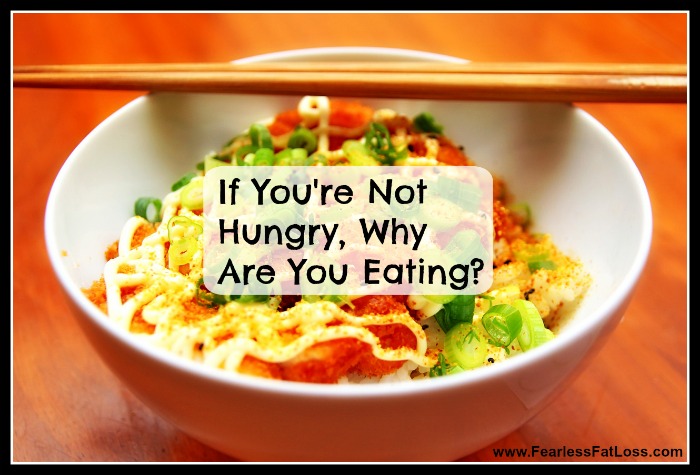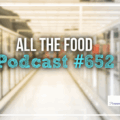
It used to be in days gone by that people ate only when hungry, because there simply wasn’t a surplus of food around. Our ancestors were hunters and gatherers; they did not have fully stocked kitchens as we do today.
Throughout history, it was common for only those who were tribal lords, rich, or of the aristocracy to have an abundance of food. Being overweight was a sign of abundance, however for the most part, the population at large were not overweight individuals.
Today, unless we live in a secluded area miles from town, we have food available at every turn: in convenience stores, gas stations, 24 hour supermarkets, drug stores, fast food drive-throughs, airports, restaurants, the local tavern, vending machines, and even hardware stores.
We only need to hop in the car or walk around the block to gain instant access to food. With the spread of the fast food and processed food industry, millions of us are overweight. Sadly, even though America is the fattest nation on the planet, other countries are not far behind due to the spread of fast food throughout the world.
If you watch television, you will see ads galore for food: food being used for celebrations, vacation, for that “late-night urge” or craving, for fun times, family gatherings, holidays, parties, and more. Food products are endorsed in movies, sitcoms, and reality shows. When we drive down the street we are bombarded by signs and advertisements for food. It is no wonder that so many of us are battling weight problems, we are surrounded by this stuff!
Unfortunately, all of this processed and fast food tastes great. It’s not a coincidence, food manufacturing is a billion dollar industry; they want us to get hooked and keep coming back for more. Because it tastes so good and is so readily available, many of us use food for reasons other than hunger.
Ask yourself this question now–when was the last time that you ate and were truly hungry? If you are in touch with your body then you may only eat when you are hungry, however so many of us eat for different reasons than hunger.
One of the main reasons for eating when not hungry is an attempt to change our feelings. When we feel stressed, anxious, angry, sad, happy, bored, or basically anything we don’t like, we reach for food to make us feel better.
For a moment, while eating, it works and we feel good, but after finishing we may feel guilt or anger with ourselves for consuming what we did. This can lead to a cycle of seeking out food for comfort, followed by negative feelings, followed by seeking out more food to bring us up again. We aren’t eating to salve hunger pangs, we are instead trying to change our emotions.
Since eating for emotional reasons rather than hunger gives our body more fuel than it needs, we can end up with more problems than we started with. This is the situation that I am in currently, having gained weight by eating to (try to) make myself feel better.
Besides eating over emotions, I have often eaten to procrastinate on unpleasant tasks, tasks that eventually I had to do anyway. After all of that eating, I am left with the problem of overweight and ill fitting clothes. The food didn’t solve my problems; it instead created more problems for me.
If you are also an emotional eater, here is a tip that has been helping me greatly: I write in a journal throughout the day and note whenever I feel anything that gives me the urge to reach for food when I’m not hungry. Some of the time I may just write down “feeling anxious” or “bored” and not go into detail, however I have found that by becoming conscious of the feeling (even if I don’t take the time to discover the root of it), I am then aware of it, and the desire for food passes.
If I do not write down how I am feeling when I suddenly want to eat and I am not even hungry, then out of habit, I tend to go for the food without even thinking about it.
This may sound simple, however it does require the action of putting pen to paper. The trick is keeping that journal with you at all times. You could even use a small pocket notebook if that would travel better, especially if you will be carrying it with you to work outside of the home.
Again, the most important step is taking the action of writing down the feeling, at the moment you recognize the urge to eat over your emotions. I have found it is not enough to only acknowledge the feeling with my thoughts, I must write it down. I have also found that I must write as soon as I realize that I’m headed down that slippery path towards emotional eating, because if I wait and say that I will catch up in my journal later, I run the risk of eating for the wrong reasons now.
While the issue of emotional eating (and weight/food issues in general) is complex and will not be solved in one post, writing down and becoming aware of how you feel is something that you can begin today. You will be able to discover for yourself if taking this action helps you to begin avoiding the self-destructive behavior of emotional eating, the way that it has helped me.
I would suggest at least a full week of writing down your feelings each day as they occur in order to judge how well this technique works for you. Along the way you may even see patterns emerge as I did, of certain times of the day that are more stressful for you than others. Feel free to leave your comments to share your experience with this activity.





I’ve just recently started a food journal. I bought a small spiral bound notebook that fits nicely in my purse and I track what I eat and how much. Just taking the time to do this, and seeing it in writing is already helping a lot!
Thankfully, I’ve never been an emotional eater, I just don’t manage my portion control or the healthiness of my food intake very well. That’s what I’m working on.
Excellent post! Thanks for sharing!
Hi Overwhelmed With Joy!
Thanks for your kind words!
Yes, keeping a food journal is key to figuring out where you’re at today. You may find that you discover trigger foods that you are eating that are causing you to overeat.
You could read my posts in the HFCS category if you’d like. You might be eating processed foods and many contain high fructose corn syrup. What happens is your brain doesn’t get the signal that you’re already full, and you keep eating (and overeating).
That’s something to be thankful for that you aren’t an emotional eater!
You’re on your way with your journal. There is a reason behind both the unhealthy foods you are eating as well as the portion size. You’ll figure it out and have one of those “aha!” moments. 😉
All the best,
JoLynn